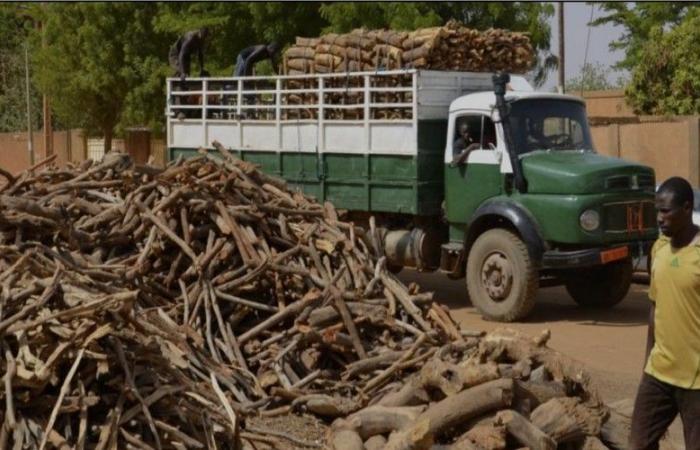Excessive logging is the main cause of deforestation in Filingué, a town located in western Niger. The Goumbin Marayya forest once represented an invaluable natural resource for local communities, but today it is disappearing at an alarming rate. More than 3,000 trees are cut down each year in the region, threatening biodiversity and worsening the impacts of climate change. This situation arises from a high demand for wood for cooking and heating, exacerbated by the inaccessibility and high cost of domestic gas.
A context of strong demand for wood in Niger
Demand for wood has increased significantly in recent years, with consumption estimates reaching 4 million tonnes in 2020. This demand results in an annual loss of nearly 120,000 hectares of forest, a figure equivalent to five times the area of Niamey, the capital of the country. In Filingué, this situation is exacerbated by the lack of effective regulation and clandestine logging, often carried out without authorization from the competent authorities.
The testimony of an illegal wood cutter illustrates the situation. “The Goumbin Marayya forest is disappearing because many of us are cutting down trees without permission. We know how to escape environmental agents through alerts and our knowledge of forest areas. This activity is the only source of income for many families in the region,” he explains.
Anarchic and illegal logging
In the town of Filingué, vehicles and carts circulate daily, transporting illegally cut wood. Moussa Inoussa, a civil society actor, describes this situation in these terms. “At the northern exit of Filingué, you can see carts loaded with wood, often after dark, when water and forestry officials are less vigilant.” These practices have become a source of income for many residents, especially in neighborhoods like Caren Dole, where logging has become a long-standing lucrative activity.
Obstacles to the fight against excessive cutting
Lieutenant Idrissa, head of the Departmental Environmental Directorate of Filingué, emphasizes that the fight against illegal logging is complicated by a low number of agents and a lack of logistical resources. “Authorities often face pressure, particularly from community leaders, who intervene to ask for favors for illegal cutters. In addition, the lack of human and material resources makes monitoring difficult,” he says.
The environmental consequences of excessive cutting
Illegal and anarchic logging in Filingué has devastating consequences for the environment. According to agronomist Racho Boubacar, this practice accelerates desertification and affects the water cycle, leading to soil degradation and loss of biodiversity. “Deforestation and soil destruction are particularly visible around Filingué, where once fertile fields are now invaded by red sand, making the land unsuitable for agriculture,” he explains.
Lieutenant Ismaël, for his part, adds that excessive cutting also contributes to water and wind erosion, accentuating the degradation of arable land and reducing agricultural yields. “In the years to come, if this trend continues, Filingué risks finding itself without green spaces, with degraded fields and increased pollution,” he warns.
Initiatives to raise awareness and restore forests
Faced with this alarming situation, several local organizations, such as the Young Volunteers Movement of Tounfalis, are carrying out awareness-raising actions to encourage the protection of trees and fight against the proliferation of plastic waste. Zouèra Ibrahim, vice-president of the organization, explains. “We organize tree planting campaigns during the Independence Day season, and raise awareness about the importance of protecting and maintaining trees.”
Solutions proposed to stem deforestation
Agronomist Racho Boubacar offers several solutions to minimize excessive wood cutting, including assisted natural regeneration and tree planting. “The State must strengthen awareness-raising actions and support communities in the sustainable management of forest resources. It is essential that the population understands that the cutting of trees must be compensated by the planting of other trees,” he adds.
For Moussa Inoussa, rigorous monitoring by the State and partners is necessary to guarantee the sustainability of reforestation actions. “Monitoring efforts must be strengthened, because without this, existing plantations will not produce any tangible results. The State must ensure continuous monitoring and ensure that reforestation efforts have a real impact,” he concludes.
An emergency for the protection of the Filingué forests
Excessive logging in Filingué represents an imminent danger for the environment, the local ecosystem and the life of future generations. It is imperative that concrete actions be put in place to regulate this practice, encourage tree planting and support local forest preservation initiatives. Collaboration between authorities, civil society and local communities will be essential to ensure the sustainability of Niger’s natural resources and preserve the ecological balance of the region.
Moctar FICUU / VivAfrik






